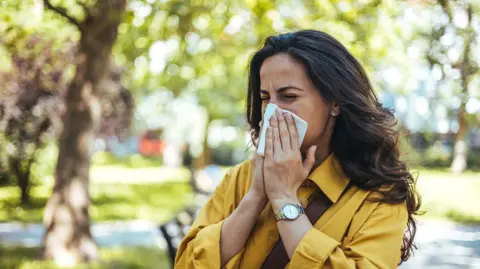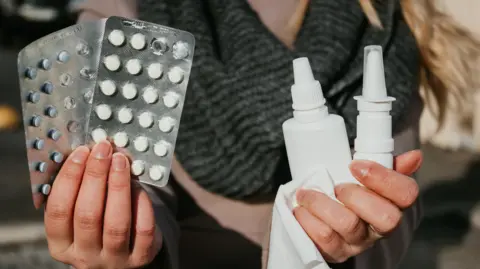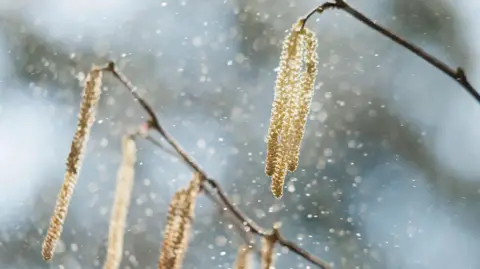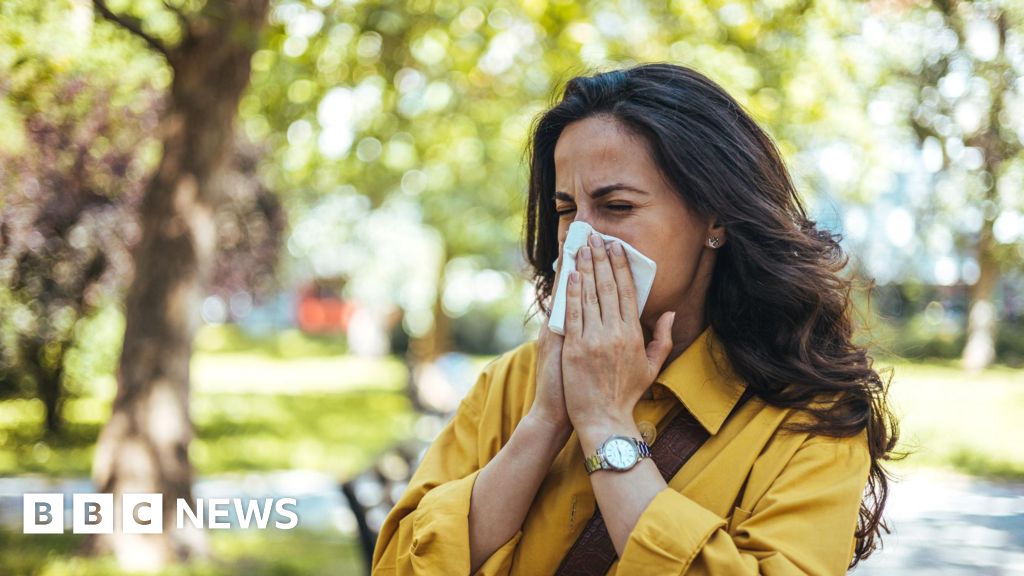Health reporters

Getty Images
Predictions indicate high to very high pollen levels across various regions of the UK in the next five days.
The fine particles emitted by specific plants, trees, and grasses are wreaking havoc for those allergic to pollen.
Common symptoms include itchy eyes, sneezing, runny noses, scratchy throats, and headaches.
So, how can you alleviate these symptoms?
Why are my eyes watering?
If you find yourself sneezing excessively, with watery eyes and disturbed sleep, it’s likely hay fever.
You are not alone—approximately one in five individuals are sensitive to pollen, typically triggered by grass, though trees can also be a factor.
Peak pollen season usually occurs in early summer when pollen grain counts spike.
This year, favorable conditions from warm weather, coupled with last year’s climatic patterns, have been ideal for birch tree pollen—a significant hay fever trigger.
Recent warm, dry days in various UK regions have exacerbated pollen distribution, coining the term ‘pollen bomb.’
Generally, urban areas display lower pollen counts than rural zones, though pollution can intensify symptoms in cities.
In the long run, climate changes are expected to impact hay fever patterns.
Altering temperatures and precipitation will likely extend the pollen season and heighten pollen concentrations in the air.
What are the most effective hay fever treatments?

Getty Images
While there is no definitive cure for hay fever, several medications can help alleviate symptoms.
Professor Stephen Till, an allergy expert from Guy’s and St Thomas’ Hospitals in London, advocates a “cocktail approach.”
This entails using:
- Long-acting antihistamine tablets or drops that do not induce drowsiness
- A steroid nasal spray
- Eye drops
“They work in different manners and are generally safe for most individuals—just consult with a pharmacist for guidance,” says Prof. Till.
These medications can be purchased over the counter at local pharmacies, where prices and effectiveness may vary, so it’s vital to identify what works best for you.
Antihistamines help reduce your body’s allergic reaction to pollen and can be taken three to four days before pollen counts start increasing.
Consider maintaining a diary of your symptoms and treatments, which can be useful for your pharmacist.
What other measures can I take to lessen symptoms?
Avoiding triggers is crucial, emphasizes pharmacist Ashley Cohen from Leeds.
“Good hygiene is key—pollen collects on your skin when outdoors, so showering and changing clothes upon returning indoors is recommended.”
He adds that pets can be effective carriers of pollen into homes.
Additional advice from the NHS includes:
- Applying nasal balms or jellies around the nostrils to catch pollen
- Wearing sunglasses, masks, or hats to prevent pollen from entering your nose and eyes
- Regularly dusting and vacuuming your home
- Trying a pollen filter in your car’s air vents
Furthermore, it’s best to avoid:
- Mowing grass or walking on grass
- Keeping fresh flowers indoors
- Smoking or being near smokers
- Drying laundry outdoors

Getty Images
What if my hay fever becomes severe?
“The majority of hay fever cases—around 90%—can be managed with over-the-counter treatments,” states pharmacist Ashley Cohen.
If your hay fever becomes particularly challenging to manage, consulting with your GP is advisable; they may refer you to a specialist, which could involve a wait.
For the most significantly affected individuals, immunotherapy could be an option, which involves gradually introducing small amounts of pollen into the body to build tolerance.
The NHS discontinued providing the steroid injection Kenalog years ago due to associated serious side effects. Likewise, Allergy UK does not endorse its use, and advertising of the drug by private clinics is no longer permitted.
Can local honey help with hay fever?
Unfortunately, no. Bees do not pollinate grasses and trees; rather, they focus on flowers that do not contribute to hay fever.
Thus, there is no scientific evidence supporting the idea that consuming local honey can alleviate hay fever symptoms caused by grass or tree pollen.


